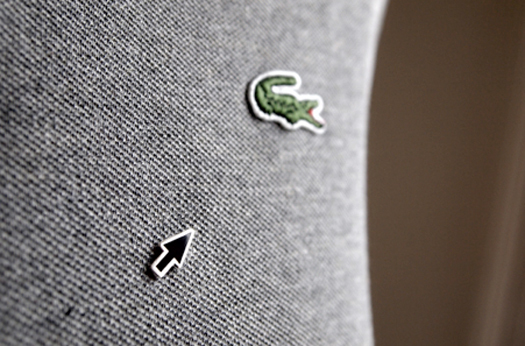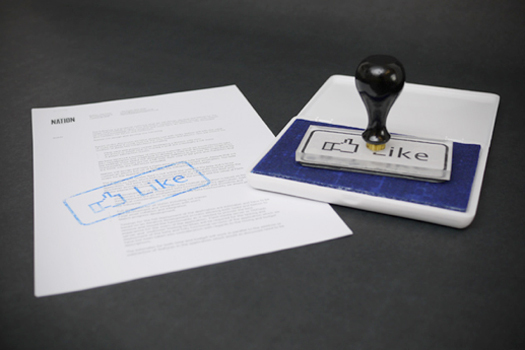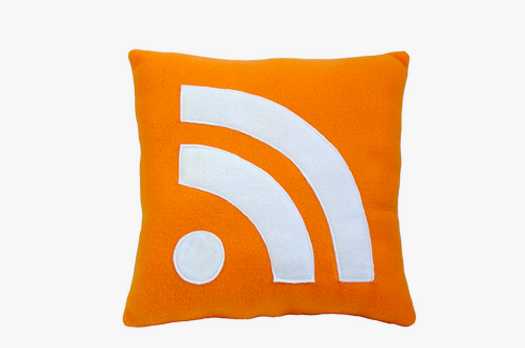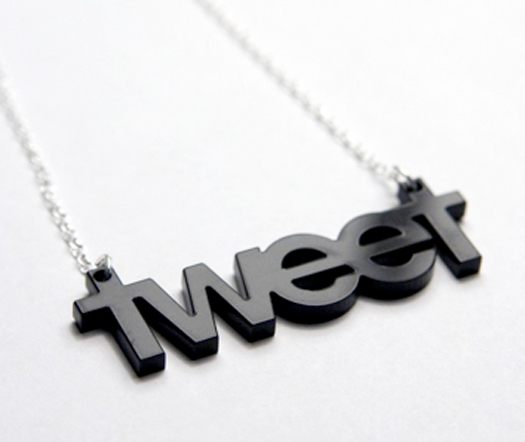More recently, I’ve been collecting a few instances of what looks like the exact opposite of the digital goods idea: things from the digital world crossing over into physical manifestations. The specific instances that got me onto this were the Emoticon Ring and the Cursor Pin (both via Book of Joe). The ring is from a collection called “Signs,” by Chao & Eero Jewel in Finland, which aims to respond to and embody digital communication and connection. The cursor pin (designed by Melle Hamer) was evidently inspired by watching a television show on a Mac, and noticing the cursor arrow ending up, by chance, resembling a pin on some character in the program.
 Emoticon Ring designed by Chao & Eero Jewel
Emoticon Ring designed by Chao & Eero Jewel
Cursor Pin designed by Melle Hamer
These curious things reminded me of “The Facebook Like Button Stamp” (by Nation) which I’d been somewhat amused by last year (via PSFK), and sent me back through my (digital) files looking for other examples of de-digitization. (That’s a fairly ugly term, of course, but it was the best I could come up with; counter-suggestions are very welcome.) 
The Facebook Like Button Stamp designed by Nation
On a purely visual level, none of these shapes strike me as intrinsically beautiful or even pleasing, so what’s the appeal? There’s something jokey about bringing a cursor arrow, emoticon, or the all-powerful “like” symbol into the physical world. But there’s something else going on here too, and it’s not the opposite of immaterialism at all. Rather, it’s the inevitable flipside of the same phenomenon. Because like all jokes, these contain a truth: a de facto acknowledgement that the border between the worlds often called “virtual” and “real” is extremely porous.
Some of the examples I’ve taken note of involve characters from video games and the like, but that doesn’t seem particularly different from a Mickey Mouse doll or a Hello Kitty bracelet. I’m more interested in the stuff with no personality at all, referencing the most banal symbols of the screen world (like this pillow with the RSS icon, by Craftsquatch) or even attempts to capture the stuff of digital life that isn’t particularly visual at all (as in this somewhat silly necklace noticed by On The Ground Looking Up, from plastique, featuring the disconcertingly large word “tweet”). Rss Pillow designed by Craftsquatch
Rss Pillow designed by Craftsquatch Tweet Necklace designed by plastique
Tweet Necklace designed by plastique
These objects remind me of friends who refer to things that happen IRL (in real life, meaning not online) with a kind of wink, suggesting that the dichotomy between digital and not-digital really has nothing to do with which one is “real.” But I suspect there’s something a little nervous-making lurking within the overt jokiness. Probably most of us see these instances of digital iconography so often, without ever really stopping to absorb them, that they’re more familiar to us than the shape of the leaves on the tree just out your window. That’s sort of funny — and sort of profoundly not funny at all. Maybe making such imagery amusingly physical takes the edge off this uncertainty. It’s clever stuff, though I have to say it’s not clever I’d need to own any of it, or even see it IRL. The digital pictures are real enough for me.


Comments [18]
06.09.11
02:26
(v) The physical reproduction of a computer domain object (CDO).
Lifactate < l ai f æ k t ei t >
(n): A computer domain object that enters physical reality.
counter-suggestion offered.
ps. nice piece of writing!
boing
06.09.11
03:27
You could use "reify" and "reification."
06.09.11
03:42
06.09.11
04:56
The Inter-tubes are leaking.
L33ted to L33k or L34k
06.09.11
05:03
06.09.11
06:47
1. REALization
2. virtual migrations
3. digi-morphs
4. Tactilization
(Thx: Joe S., John L., Deirdre N.)
06.09.11
08:43
06.10.11
01:36
http://twitpic.com/5362v4
06.10.11
02:36
06.10.11
04:06
06.10.11
12:55
06.10.11
02:36
06.10.11
02:38
"Tactilization."
http://twitter.com/#!/core77/status/78880051319406593
Lots of other good suggestions here though. Even if I'm not sure I'm ready to dethrone dedigitization quite yet.
http://murketing.tumblr.com/tagged/De-digitization
Tim: Very thoughtful comment, I like the notion of it as a "new genre of fandom." Still pondering that.
Florian: Great link!
Thanks all...
06.10.11
08:01
This is very interesting statement to me, being a vanguard member of what will surely come to be known as the "internet generation". While the icon is, indeed, fairly lifeless aesthetically, I instinctually feel like it has a powerful personality - that of all the websites in my feed.
A better illustration in my personal case would be reddit's upvote arrow or "orangered" envelope indicating that I have a private message. Feelings and personality are attached to these relatively inert symbols - they are the hivemind coming to call.
06.11.11
11:01
07.02.11
04:51
08.08.11
01:27
Also, for anybody interested, I still track examples of this sort of thing, here:
http://murketing.tumblr.com/tagged/De-digitization
11.17.11
04:58